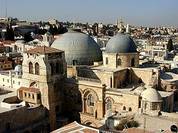Lectio Divina: A Popular Revival Underway
Our Holy Father has recently urged Catholics to renew an ancient practice in the Church, namely to initiate the regular devotional practice of lectio divina.
In lectio divina the Scriptures are opened up to their interior or hidden meaning by the action of the Holy Spirit, as our spirit is lifted up from earth to heaven to "touch heavenly secrets." This occurs through a four stage process that includes reading, meditation, prayer and contemplation. As Guigo II, ninth abbot of the Grand Chartreuse, writing in the twelfth century described it concisely:
Our Holy Father has recently urged Catholics to renew an ancient practice in the Church, namely to initiate the regular devotional practice of lectio divina.
In lectio divina the Scriptures are opened up to their interior or hidden meaning by the action of the Holy Spirit, as our spirit is lifted up from earth to heaven to "touch heavenly secrets." This occurs through a four stage process that includes reading, meditation, prayer and contemplation. As Guigo II, ninth abbot of the Grand Chartreuse, writing in the twelfth century described it concisely:
 RSS Feed
RSS Feed

